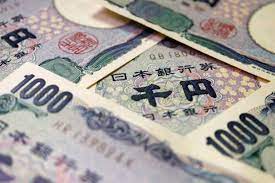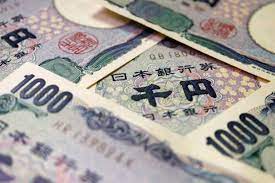
On Wednesday, the yen fell to a 34-year low of 151.97 against the US dollar, raising concerns in the market about possible government action to support the Japanese currency.
After recovering some of its losses, the yen was last trading at 151.22 against the dollar at 10:19 a.m. London time.
At the conclusion of the previous year, the value of the Japanese yen fell to a historic low of 151.95 versus the US dollar in October 2023.
Many investors have concluded that Japanese policymakers may intervene to support the weakening yen as a result of the currency's decline. According to Japan's finance minister Shunichi Suzuki, taking action to "respond to disorderly FX moves" is still an option.
Reports state that Masato Kanda, the vice finance minister for international affairs, stated on Wednesday that the movements of the yen were being closely and urgently monitored after the Bank of Japan met with representatives from the finance ministry and the Financial Services Agency.
He continued, "Recent fluctuations, which have been as high as 4% in the last two weeks, were not regarded as minor changes."
Kanda pointed out that BOJ officials have stated that the central bank would take monetary policy actions in response if changes in the foreign exchange market had an impact on Japan's economy.
Analysts speculated that future developments could trigger a stronger chance of involvement, as implied by Suzuki's statements and the movements of the yen.
“There is now a higher chance of Japanese FX intervention. Another sharp lift in USD/JPY in the near term can be the catalyst,” analysts from the Commonwealth Bank of Australia said in a note on Wednesday.
According to a Bank of America Global Research research, while involvement is a "realistic option" for the Japanese government, long-term issues might not be resolved.
“As the yen’s decline is a result of a mixture of structural capital outflows and elevated USD/JPY carry, and not only speculation, FX intervention would not be a fundamental fix,” the report said.
At the end of 2023, Japan's economy suddenly entered a technical recession after contracting for two straight quarters. After decades of dealing with deflation, the nation now has to contend with inflation. The Bank of Japan made history earlier this month when it decided to abandon its yield curve control programme and halt its negative interest rate policy, which led to a yen sell-off.
Kanda has previously stated that a weaker yen offers advantages and disadvantages. For instance, the weakening of the currency has increased travel and improved stock market performance.
(Source:www.economictimes.com)
After recovering some of its losses, the yen was last trading at 151.22 against the dollar at 10:19 a.m. London time.
At the conclusion of the previous year, the value of the Japanese yen fell to a historic low of 151.95 versus the US dollar in October 2023.
Many investors have concluded that Japanese policymakers may intervene to support the weakening yen as a result of the currency's decline. According to Japan's finance minister Shunichi Suzuki, taking action to "respond to disorderly FX moves" is still an option.
Reports state that Masato Kanda, the vice finance minister for international affairs, stated on Wednesday that the movements of the yen were being closely and urgently monitored after the Bank of Japan met with representatives from the finance ministry and the Financial Services Agency.
He continued, "Recent fluctuations, which have been as high as 4% in the last two weeks, were not regarded as minor changes."
Kanda pointed out that BOJ officials have stated that the central bank would take monetary policy actions in response if changes in the foreign exchange market had an impact on Japan's economy.
Analysts speculated that future developments could trigger a stronger chance of involvement, as implied by Suzuki's statements and the movements of the yen.
“There is now a higher chance of Japanese FX intervention. Another sharp lift in USD/JPY in the near term can be the catalyst,” analysts from the Commonwealth Bank of Australia said in a note on Wednesday.
According to a Bank of America Global Research research, while involvement is a "realistic option" for the Japanese government, long-term issues might not be resolved.
“As the yen’s decline is a result of a mixture of structural capital outflows and elevated USD/JPY carry, and not only speculation, FX intervention would not be a fundamental fix,” the report said.
At the end of 2023, Japan's economy suddenly entered a technical recession after contracting for two straight quarters. After decades of dealing with deflation, the nation now has to contend with inflation. The Bank of Japan made history earlier this month when it decided to abandon its yield curve control programme and halt its negative interest rate policy, which led to a yen sell-off.
Kanda has previously stated that a weaker yen offers advantages and disadvantages. For instance, the weakening of the currency has increased travel and improved stock market performance.
(Source:www.economictimes.com)





